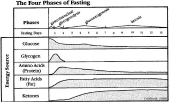



When I've read accounts of people who have done extended fasts, they do say it gets easier after the third day, so maybe you are talking about fasting? Wow.

Amy Francis wrote:Obviously what was the case may not now be true with better knowledge. At the time i.e. the last century, I read that fasting slowed down the metabolism which put me off continuing (and now I can't fast because I have high blood pressure!)

Julia Winter wrote:I've been doing short fasts (I eat between 6pm and 9pm most days and have for more than a year) but they aren't water fasts. I allow myself coffee with dairy during the day. It's working well for me.
I'm going to quibble about ketosis. My understanding is that it takes 12 hours to burn through your glycogen, and then you start burning fat.

I really like Dr. Jason Fung on this topic.

r ranson wrote:
Robert Joseph wrote:
I don't know you health history, ... "There are causes of health and causes of disease. Practice causing health and you will have it. Stop causing disease and it will disappear."
Yes, it's a very long and complicated history. About 15 years ago, I was told to set my affairs in order by the end of the week, due to an infection. It's in remission now, but it's done a lot of damage. The journey has given me a lot of experience with naturopathic and allopathic medical systems in two countries, and I've seen the extreme ends of good and bad in both those medical styles. What I learned is I need to take the active roll in my own health. Doctors are advisers but it's me who is taking the pills or making the lifestyle change. If their medical advice doesn't fit with my style or I don't understand it, it is up to me to question the doctor and seek a path to health together.
One trick I find really useful is to repeat to the doctor what I understood of the conversation. Not only does this provide an opportunity for them to correct misinterpretation, but it shows them that I actually listened to them! Revolutionary, apparently. My active listening makes them more interested in helping me become healthy because they feel listened to and valued. It's such a simple trick but it's improved the care I've gotten tremendously!
Be careful about the advice of your GP. The vast majority of conventional docs have no clue about fasting, haven't done any fasting themselves, and have no clinical experience with it. If your GP does happen to have some good knowledge and experience with it, great! Best to ask him/her directly about what they know. It's all well and good to read (2nd hand) the science studies about fasting, but there's nothing like doing it yourself and supervising it for hundreds of others to really know what fasting is about.
This is a good point.
GPs have a tough time of it because they have to know enough about every part of the human body and psyche to give a primary diagnosis and get us to the right specialist. They have to be in-depth generalists and it's easy to assume they know everything! The thing is, they are also human and the best ones I've had will admit "I haven't seen that before, but I'll go ask my colleagues in the next room if they have".
I'm very lucky in the way my doctor approaches things - the doctor knows the patients are going to try alternative treatments and doesn't poo poo them, but instead says "that's neat, I don't have any medical reason to say that will work or not, but let's monitor it and make sure it's safe to try that". That's where the doctor first learned about fasting and saw it working for that person. They investigated it, went to some classes, tried it for themselves, and now suggests it in some cases.
Before I started the fasting, my doctor sent me home with the suggestion of some books to get from the library - both for and against - so that I can go into this well informed. I admit, if I hadn't read those books, I probably wouldn't have tried it as it seems crazy and contrary to what I was told by earlier health professionals.

r ranson wrote:I haven't had a lot of success with it fixing the main problem it was supposed to tackle.
I don't think I'm going into a keto state during my fast time. I don't have the symptoms nor the smell.
absolutely - having measurable results before and after are wonderful! Not just Keto but any big change in diet or treatment.